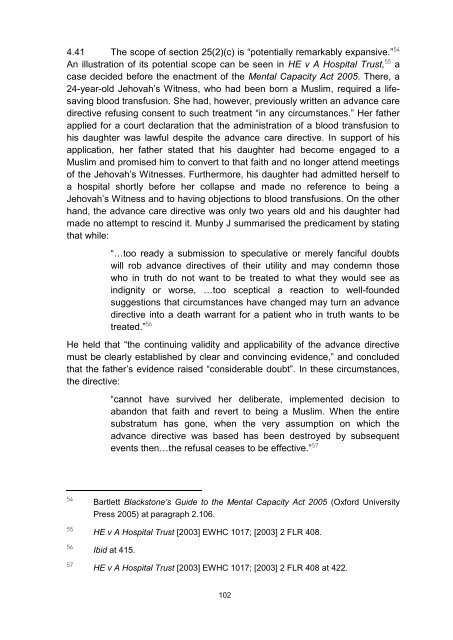Consultation Paper on Bioethics - Law Reform Commission
Consultation Paper on Bioethics - Law Reform Commission
Consultation Paper on Bioethics - Law Reform Commission
You also want an ePaper? Increase the reach of your titles
YUMPU automatically turns print PDFs into web optimized ePapers that Google loves.
4.41 The scope of secti<strong>on</strong> 25(2)(c) is “potentially remarkably expansive.” 54<br />
An illustrati<strong>on</strong> of its potential scope can be seen in HE v A Hospital Trust, 55 a<br />
case decided before the enactment of the Mental Capacity Act 2005. There, a<br />
24-year-old Jehovah‟s Witness, who had been born a Muslim, required a lifesaving<br />
blood transfusi<strong>on</strong>. She had, however, previously written an advance care<br />
directive refusing c<strong>on</strong>sent to such treatment “in any circumstances.” Her father<br />
applied for a court declarati<strong>on</strong> that the administrati<strong>on</strong> of a blood transfusi<strong>on</strong> to<br />
his daughter was lawful despite the advance care directive. In support of his<br />
applicati<strong>on</strong>, her father stated that his daughter had become engaged to a<br />
Muslim and promised him to c<strong>on</strong>vert to that faith and no l<strong>on</strong>ger attend meetings<br />
of the Jehovah‟s Witnesses. Furthermore, his daughter had admitted herself to<br />
a hospital shortly before her collapse and made no reference to being a<br />
Jehovah‟s Witness and to having objecti<strong>on</strong>s to blood transfusi<strong>on</strong>s. On the other<br />
hand, the advance care directive was <strong>on</strong>ly two years old and his daughter had<br />
made no attempt to rescind it. Munby J summarised the predicament by stating<br />
that while:<br />
“…too ready a submissi<strong>on</strong> to speculative or merely fanciful doubts<br />
will rob advance directives of their utility and may c<strong>on</strong>demn those<br />
who in truth do not want to be treated to what they would see as<br />
indignity or worse, …too sceptical a reacti<strong>on</strong> to well-founded<br />
suggesti<strong>on</strong>s that circumstances have changed may turn an advance<br />
directive into a death warrant for a patient who in truth wants to be<br />
treated.” 56<br />
He held that “the c<strong>on</strong>tinuing validity and applicability of the advance directive<br />
must be clearly established by clear and c<strong>on</strong>vincing evidence,” and c<strong>on</strong>cluded<br />
that the father‟s evidence raised “c<strong>on</strong>siderable doubt”. In these circumstances,<br />
the directive:<br />
“cannot have survived her deliberate, implemented decisi<strong>on</strong> to<br />
aband<strong>on</strong> that faith and revert to being a Muslim. When the entire<br />
substratum has g<strong>on</strong>e, when the very assumpti<strong>on</strong> <strong>on</strong> which the<br />
advance directive was based has been destroyed by subsequent<br />
events then…the refusal ceases to be effective.” 57<br />
54 Bartlett Blackst<strong>on</strong>e‟s Guide to the Mental Capacity Act 2005 (Oxford University<br />
Press 2005) at paragraph 2.106.<br />
55 HE v A Hospital Trust [2003] EWHC 1017; [2003] 2 FLR 408.<br />
56 Ibid at 415.<br />
57 HE v A Hospital Trust [2003] EWHC 1017; [2003] 2 FLR 408 at 422.<br />
102

















